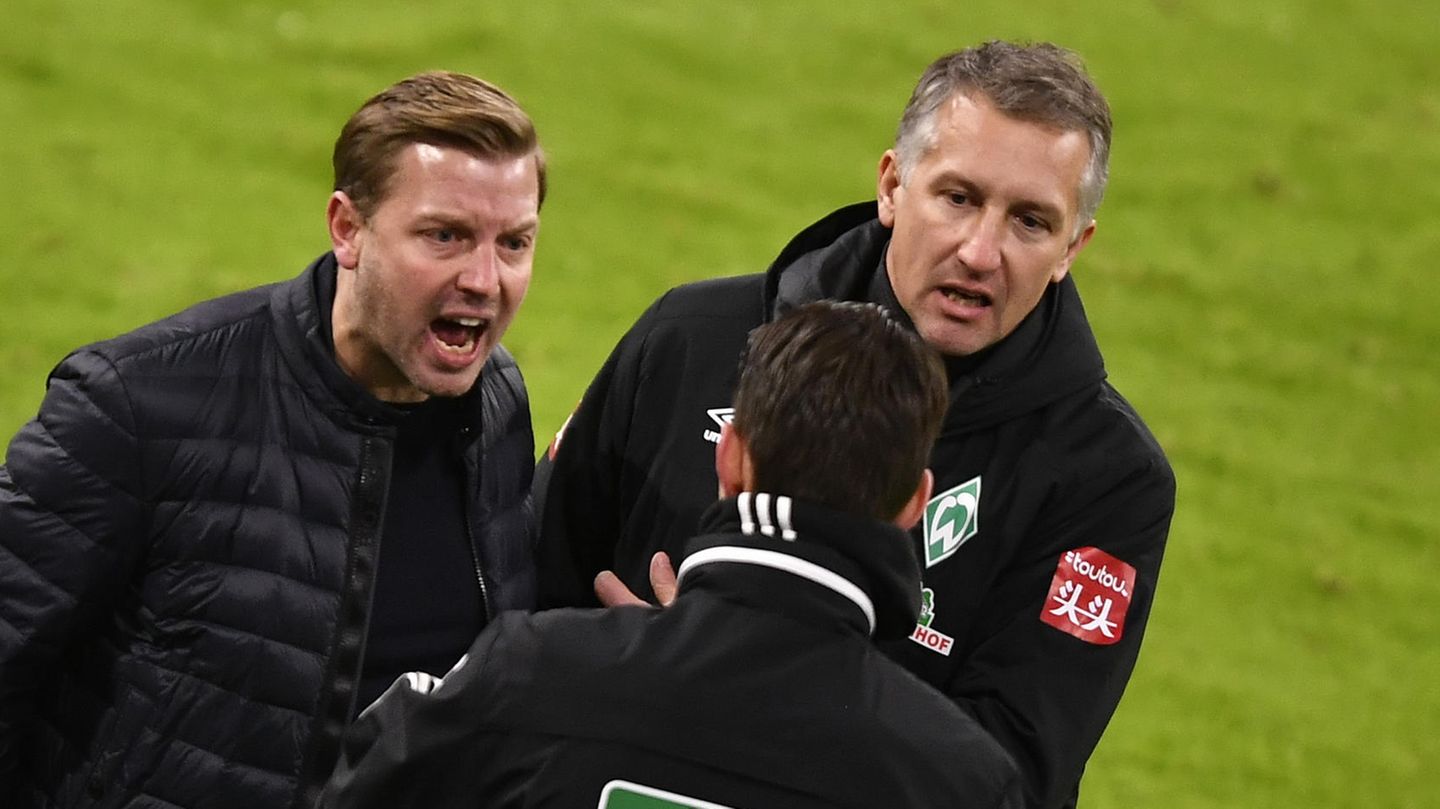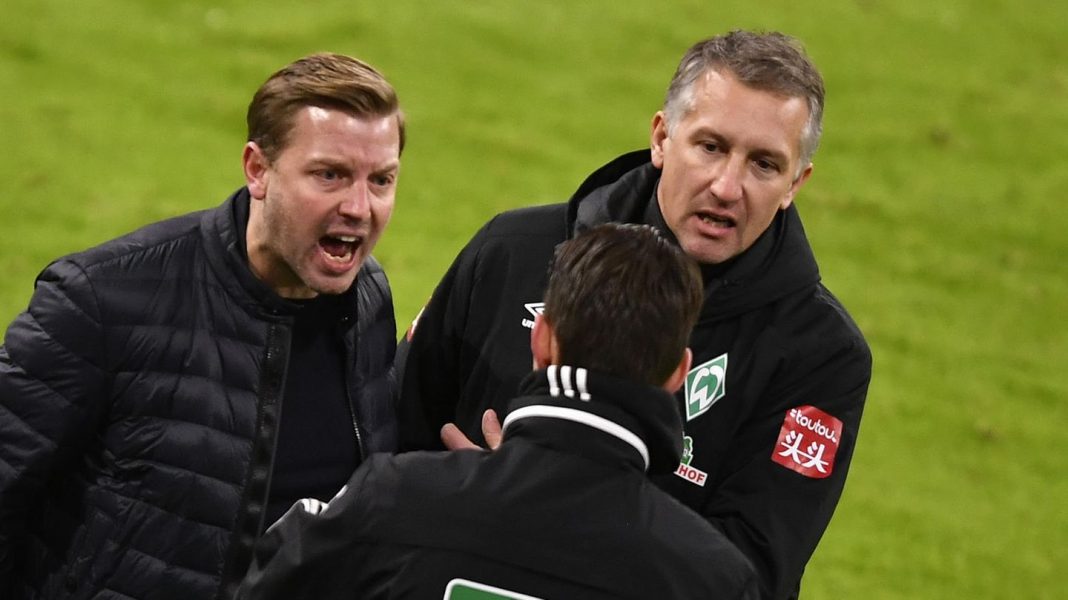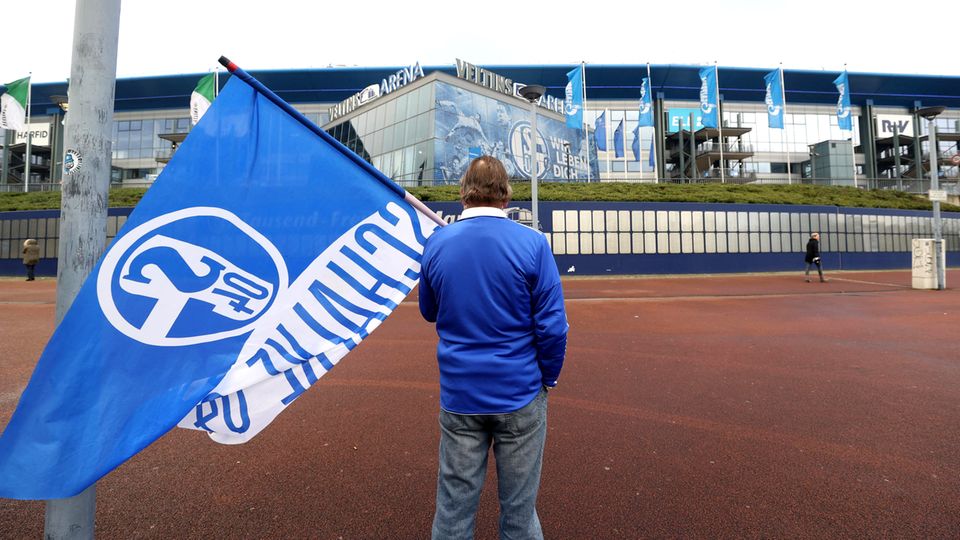Opinion
Horror at the Weser
The failure: how overconfidence and false loyalty led to Bremen’s relegation

Florian Kohfeldt (l.) and Frank Baumann during a game in dispute with the fourth official
© Lukas Barth / DPA
Bremen has long been a natural candidate for relegation due to acute financial problems. But coach Florian Kohfeldt and manager Frank Baumann are responsible for the current decline.
After the 24. Matchday Werder Bremen had 30 points on the account, an advance of eleven points on Arminia Bielefeld, which stood at this time on the relegation place. After the 34th matchday, Bremen recorded 31 points, while Bielefeld accumulated 35 points. The result: Werder Bremen have been relegated from the Bundesliga after 41 years. While Bielefeld stays inside.
What happened during this time?
The answer is: a drop in tension, which the club now pays dearly with the relegation. Until this time, Bremen had choked through the season with a heart-freshening unsightly football. Coach Florian Kohfeldt had ordered his team without regard to losses a wall and security tactic, which was a torture for fans and spectators, but fulfilled its purpose. Werder painstakingly collected point after point. Partly happy victories like against Hertha BSC and Arminia Bielefeld rounded off the picture.
Long Chain
But after the 24th matchday came the break. Bremen took only one point from their last ten games. One reason was certainly that Werder felt too safe too soon. Already celebrated in the media as saved, this mood apparently transferred to the team and coach – a serious mistake, which one has to blame Kohfeldt in particular.
The second mistake in the final phase of the season was that manager Frank Baumann stuck to Kohfeldt for far too long. At the latest after the desolate defeat against Union Berlin, the Bremen leadership should have acted, but held on to Kohfeldt with a peculiar ultimatum. The demand: The team should make a committed appearance in the Cup semi-final against RB Leipzig, then you would have further confidence in the coach. It was like this (which was not difficult to expect) and Kohfeldt remained in charge for two more games until Baumann pulled the rip cord and reactivated Thomas Schaaf for the season finale. It was a helpless attempt at the end.
Kohfeldt, who was Bundesliga Coach of the Year in 2018, enjoyed a confidence boost for too long as a member of the much-quoted Bremen family. What Werder often made strong in the past was a blemish in this case.
The messed-up final phase of the season, however, is only the end of a long chain of errors that the Bremen management has been fabricating since 2019. It began with the departure of Max Kruse, who had led Werder to eighth place in the 2018/19 season and into the Cup semi-finals. The good placement was happy (and thanks to the special dynamics of a season-ending phase, in which many teams are no longer concerned), but led to the new season dreaming of a European Cup place. Kohfeldt and Baumann should establish an era like Schaaf/Allofs-also that such a grandiose misjudgment
Total misunderstanding of one’s own abilities
Even then, in Bremen, people began to use the past as a benchmark for the future, completely ignoring their own abilities – a mistake that has always been glossed over by arch-rival Hamburger SV.
The result was: instead of brilliant European Cup evenings, the crash followed. Baumann, who had made such successful transfers as Kruse and Thomas Delaney, did not succeed in finding adequate replacements, especially for playmaker Kruse. For a lot of money Werder committed players like Yuya Osako or Ömer Toprak, who did not meet the requirements and have hardly any resale value. The highly praised talent Milot Rashica went from a bearer of hope to a problem. Badly battered by an extreme injury series, Werder saved himself last season only with good luck in the relegation. For the new season, the money for new players was missing, Werder even had to hand over midfield engine Davy Klaassen without looking for a successor.
This season things went better at first. Kohfeldt prescribed a defensive order to his playfully limited team, which worked until the 24. Matchday. But in the end, the accumulation of errors was too great.
The fall to the second league weighs heavily, because Werder will have to reduce its budget by 40 percent. And as far as the project of direct resurgence is concerned, a look at the HSV, which did not make it in three years, also helps in the assessment. But we have a real northern derby again. Probably for a long time.






